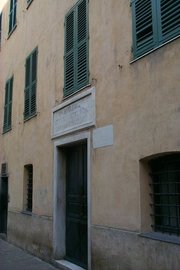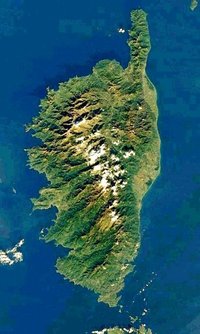Corsica
|
|
- This article is about the Mediterranean island. For the place in the United States, see Corsica, South Dakota.
Template:Infobox French Région Corsica (Corsican: Corsica; French: Corse) is the fourth largest country in the Mediterranean Sea (after Sicily, Sardinia, and Cyprus). It is located west of Italy, southeast of France, and north of the island of Sardinia. It forms part of the French Republic, and is known as the birthplace of Napoleon Buonaparte.
| Contents |
Geography
Politically, Corsica is governed as a région of France, though there are significant local movements calling for greater autonomy or independence. It has 260,196 inhabitants, and an area of 8,682km2. There are some political points which can be directly treated regardless of France if they consider island development or tourism development.
With 1000km of littoral and more than 200 beaches, Corsica is largely mountainous too, which cumlinates to 2710m with Monte Cintu and 50 other summits of more than 2000m. The island has a natural park (Parc Naturel Régional de Corse), which protects thousands of rare animal and plant species. It was created in 1972 and includes the Golfe de Porto, the Réserve Naturelle de Scandola (a UNESCO World Heritage Site, and some of the highest peaks on the island. This park is protected and can't be reached on foot, but sumptuous sail are available in order to discover unique landscapes.
Main towns: (Corsican names)
- Ajaccio (Aiacciu) – also known by its Latin name of Ajax
- Bastia (Bastia)
- Corte (Corti)
- Sartene (Sartè)
Other towns and villages:
- Saint-Florent (San Fiurenzu)
- Calvi (Calvi)
- Porto-Vecchio (Porti Vechju)
- Bonifacio (Bunifaziu)
- Appietto (Appiettu)
History
Because of the strategic position it occupies in the Mediterranean, Corsica has long been considered significant as a platform for military operations, particularly during the several centuries of violent conflict between Italy and France. During those times, possible unification with the neighbouring island of Sardinia was seen as a dangerous eventuality by many European states, because it would have granted to the ruler of the islands a dominant position in the Mediterranean Sea.
The city state of Genoa held sway over the island for centuries before giving Corsica to France in 1768 to help pay off a debt. An important figure in Corsican history is Pasquale Paoli (1725-1807), the Corsican general and patriot, who struggled for Corsican independence, first against Genoa, then against France. It's essentially with him that the head of Moor ("Testa Maura") become (1760) the emblem of Corsica.
Corsica is also the birthplace of Napoleon Bonaparte, who was born into a family in the minor Corsican nobility. Corsica was under French control at the time, and Corsican nobles were offered the ability to gain French titles if they could prove their genealogy sufficiently. In the attempt to do that, Napoleon’s parents travelled to court in France, and like many other Corsican nobles, sent their son to school there.
Administration
The regional capital of Corsica is Ajaccio (Corsican: Aiacciu). The region is divided in two départements: Corse-du-Sud and Haute-Corse. These two departments were created on September 15, 1975 by dividing up the former department of Corse.
Recent attempts to gain greater autonomy for the region have failed. A local referendum held in 2003 was voted down by a narrow margin.
Economy
Tourism plays a major role in Corsican economy. The island's pleasant climate and the beautiful mountain and sea landscapes make it a popular destination among the French and other Western Europeans. However the island has not had the same level of intensive development as some other parts of the Mediterranean and is thus as relatively unspoilt. Tourism is particularly concentrated on the area around Porto Vecchio and Calvi in the west of the island, and Bonifacio in the south.
Politics
Corsica is currently governed as a region of France. There are several movements on the island calling for some degree of Corsican independence from France, although some are rather in favor of autonomy rather than full independence. Generally speaking, autonomist proposals focus on the promotion of the Corsican language, more power for local governments, and some exemptions from national taxes additional to those that currently apply to Corsica.
The French government is opposed to full independence, fearing it would threaten the unity of France, but has at times shown support for some level of autonomy. There is significant support on the island for proposals for greater autonomy, but in votes held on the island movements calling for full independence have not gained a majority of support.
Some groups who claim to support Corsican independence have carried out a violent campaign since the 1970's including bombings and a few assassination attempts, usually targeting pieds-noirs and other non-Corsicans or buildings and officials representing the French government. The peaceful occupation of a pied-noir vineyard in Aléria in 1975 marked a turning point when the French government responded with overwhelming force, eliciting sympathy for the rebels. However, events such as the murder of prefect Claude Érignac on February 6, 1998 (for which Yvan Colonna was arrested five years later) have only served to convince many in Corsica as well as in the French government and the general French population that the nationalists cannot be trusted with more autonomy. Recent attacks on Muslims have reinforced this opinion.
Some of the "independentist" groups are known to practice extortion and other intimidatory tactics, not dissimilar from mafia activity in Sicily and southern Italy. Non-Corsican homeowners may be threatened with the destroying of their home, to be avoided only through the payment of a ransom. Journalists writing articles critical of the armed groups are threatened. Prosecutions are made difficult by a pervasive "law of silence". It is sometimes suggested that such behavior is directly related to longstanding cultural traditions of banditry in the rugged interior of the island. In 2000, Prime Minister Lionel Jospin agreed to grant an increased degree of autonomy to Corsica in exchange for a cessation of violence. The proposed autonomy for Corsica would include greater protection for the Corsican language (Corsu), the traditional language of the island, which, like other regional or minority languages in France, had in the past been discouraged. However, the plans were opposed by the Gaullist opposition in the French National Assembly, on the grounds that they would lead to calls for autonomy also for other regions (such as Brittany, Provence and Alsace), and eventually threaten the unity of France as a country.
In a referendum on July 6, 2003, a narrow majority of Corsican voters opposed a project from the government of Jean-Pierre Raffarin and interior minister Nicolas Sarkozy that would have modified the political institutions of the island and granted them greater autonomy.
| Régions of France | 
|
|---|---|
| Alsace | Aquitaine | Auvergne | Bourgogne | Bretagne | Centre | Champagne-Ardenne | Corsica | Franche-Comté | Île-de-France | Languedoc-Roussillon | Limousin | Lorraine | Midi-Pyrénées | Nord-Pas de Calais | Lower Normandy | Upper Normandy | Pays-de-la-Loire | Picardie | Poitou-Charentes | Provence-Alpes-Côte d'Azur | Rhône-Alpes | |
| Overseas Régions | |
| Guadeloupe | Guyane | Martinique | Réunion | |
See also
External links
- PhotoGlobe - Corsica (http://www.photoglobe.info/db_corsica/index.html) A collection of photos of Corsica together with GPS-based positions
- CNN (http://www.cnn.com/2003/WORLD/europe/07/06/corsica.poll/index.html) CNN coverage of rejection of autonomy proposals in 2003
- Calvi (http://www.calvi-location.fr) a presentation of Calvi (Haute-Corse)
- Corsica-Isula (http://www.corsica-isula.com) very helpful website on Corsica
- Visiting Corsica (with maps and photos) (http://france-for-visitors.com/corsica/corsica.html)
- Photos of Corsicamore (http://www.corsicarobase.com) than 800
bg:Корсика ca:Còrsega co:Corsu da:Korsika de:Korsika et:Korsika es:Córcega eo:Korsiko fr:Corse it:Corsica he:קורסיקה ka:კორსიკა hu:Korzika nl:Corsica ja:コルシカ島 no:Korsika pl:Korsyka pt:Córsega sl:Korzika fi:Korsika sv:Korsika zh:科西嘉岛


